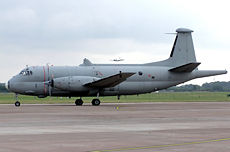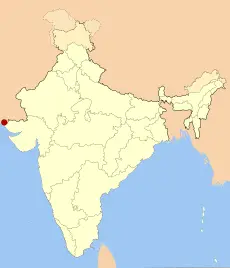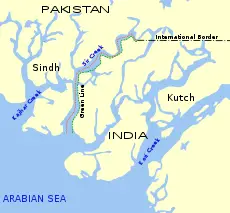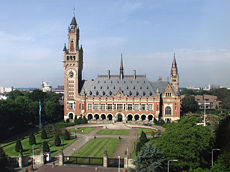Atlantique Incident
The Atlantique Incident represented an event in which the Indian Air Force shot down a Pakistan Navy plane, Breguet Atlantique, carrying sixteen people on board, citing violation of airspace. The episode took place in the Rann of Kutch on August 10, 1999, just a month after the Kargil War, creating a tense atmosphere between India and Pakistan. The downing represented the Pakistan Navy's only loss of an airplane to hostile fire in its history.
The Atlantique Incident, taking place one month after the end of the Kargil War, heightened tensions between the two nations. Each nation had tested nuclear weapons in 1998, meaning even relatively minor incidents could devolve into a nuclear exchange. The Indian Air Force had reason to suspect the Pakistan Navy of intentional violation, in light of the apparent deceptive attempt to seize Kargil. Yet, in a less tense time, the Indian government would have to question why a navy plane, most likely unarmed, would put the lives of sixteen personnel in harms way without protection. In any case, the Atlantique Incident ratcheted up the tension between the two countries another notch. Fortunately, recently, relations between India and Pakistan have been normalizing.
The confrontation
The French-built naval plane Breguet Atlantique (Breguet Br.1150 Atlantique) plane, flight Atlantic-91,[1], one of the Pakistan Navy's front line aircraft, has been used primarily for patrol and reconnaissance (though capable of being fitted with air-to-surface missiles and anti-submarine weapons). Atlantic-91 left Mehran (Sindh province) Naval Base in Pakistan at 9:15 a.m. (PST). An Indian Air Force ground radar picked up the flight path of the plane approaching the International Border.[2] The Indian Air Force soon scrambled two IAF Mig-21 interceptor aircraft of No.45 Squadron, from the Indian airbase at Naliya in the Kutch region.[3] After a series of maneuvers—and a conflicting version of events from both sides—the two jets received clearance to shoot down the Pakistani plane. At 11:17 a.m. IST (10:47 a.m. PST), nearly two hours after takeoff from Pakistan, the Indian Air Force jets intercepted the Atlantique, Squadron Leader P.K. Bundela and fired infrared homing air-to-air missile at it, hitting the engine on the port side of the plane.[4] That resulted in the aircraft losing control and spiraling towards a crash at approximately 11:00 a.m. PST, killing all sixteen on board the Atlantic-91, including five officers of the Pakistan Navy.
The incident constituted the Pakistan Navy's only loss of an aircraft to hostile fire in its history, and the biggest combat-related casualty for the navy since the Indo-Pakistani War of 1971.
Claims and counterclaims
The event immediately sparked claims and counter-claims by both nations. Pakistan claimed that the plane had been unarmed, that debris had been found on Pakistan's side of the border,[5] providing evidence that the aircraft had remained in Pakistan airspace. According to the official Pakistan version of events, the plane merely flew on a "routine training mission inside Pakistan air space."[6] The Pakistani Prime Minister stated during the funeral service of the airmen that the shooting constituted "a barbaric act."[7]
The Indian Air Force claimed that the aircraft failed to respond to international protocol and that the plane acted in a "hostile" manner, adding that the debris of a downed aircraft fell over a wide area. Indian sources stated that the BBC initially quoted the Pakistani Information Minister, Mushahid Hussein, as saying that the aircraft flew on a "surveillance" mission.[8] India also argued that the plane violated a bilateral agreement signed between India and Pakistan in 1991. The treaty states that no military aircraft would fly anywhere near 10 km from the border.[9] Indian experts also questioned why a training mission flew so close to international borders, since all air forces clearly demarcate training areas for flight, located well away from the borders. According to them, the Pakistanis made an untenable claim, since the Atlantique primarily operates over the sea; carrying out a training flight over land deep inside foreign territory indicated a surveillance mission. India displayed part of the wreckage of the Pakistani naval aircraft at New Delhi airport the next day. Pakistan alleged that Indian helicopters had removed the wreckage from its side of the border.
While Pakistan said that the plane had been unarmed and the debris fell within Pakistani territory, India maintained that warnings had been given to the Atlantique and that its flight trajectory meant it could have fallen on either side of the border. According to the Indian version of events, the MiGs tried to escort it to a nearby Indian base, when the Pakistani aircraft turned abruptly and tried to make a dash for the border, drawing Indian fire. India claimed that the debris had been found in a radius of 2 km on either side of the border and that the intrusion took place 10 km inside the Kori Creek, in Indian territory. Pakistan requested that the matter be taken up in the UN. Indian officials pointed to previous violations in the area, that in the previous year a Pakistani unmanned surveillance aircraft had intruded 150 km inside the Indian border, coming close to the Bhuj air base before the IAF spotted it and brought it down with several missiles.[10] They further added that Pakistani military aircraft had violated Indian airspace at least fifty times since January 1999, showing videotapes of Pakistani Atlantiques "buzzing," or flying provocatively near the Indian Navy's warships in the Indian Ocean.[11] Some Indian analysts stated that an Atlantique had been nearly destroyed in 1983, on a similar encounter, noting other close encounters as well as violations by Pakistani naval planes.[12]
Independent defense experts stated that the Atlantique probably conducted a "probe" on India's air defense system, mainly the radar equipment in the border area; they advised that Pakistan had never intended aggressive military action. Foreign diplomats who visited the crash site noted that the plane "may have strayed into restricted space," and that Islamabad had been unable to explain why the plane flew so close to the border; they added that India's reaction to the incident had been unjustified.[13] Many countries, the G8, the permanent members of the UN Security Council, as well as the western media questioned the wisdom behind Pakistan's decision to fly military aircraft so close to the Indian border.[14] They advised that Pakistan should exercise more caution, especially after the Kargil episode.
Rise in tensions
On the day following the attack, the Pakistan Army attacked an IAF helicopter carrying journalists to the site of the attack with a surface-to-air missile. Pakistani officials asserted that Pakistan fired upon Indian jets when they had intruded into Pakistani airspace near the Atlantique wreckage site, along the border between the Indian state of Gujarat and Pakistan's Sindh Province. International and Indian television journalists traveling in the chopper said the aircraft shook severely and a flash appeared in the air, suggesting a missile had been fired at it.[15] The IAF thus aborted their mission to display Atlantique wreckage on Indian soil.[16]
The rising tensions in the area, coupled the dispute over the Sir Creek territory, led to both the countries' militaries near the Rann of Kutch and nearby going on high alert. Pakistan sent a company of soldiers, equipped with both laser guided and infrared homing shoulder-fired surface-to-air missiles, to the site near the border. Coming barely weeks after the Kargil Conflict, where both nuclear armed countries fought high altitude warfare, the international community viewed the incident with growing concern. The U.S. State Department termed the subcontinent as being in a state of "continued high-stakes tension."
Lawsuit
On September 21, 1999, Pakistan lodged a compensation claim at the International Court of Justice (ICJ) in The Hague, accusing India of shooting down an unarmed aircraft. Pakistan sought about $60 million in reparations from India and compensation for the victims' families (The cost of the aircraft lost in the incident is put at >$35 million.) India's attorney general, Soli Sorabjee, argued that the court lacked jurisdiction,[17] citing an exemption it filed in 1974, to exclude disputes between India and other Commonwealth States, and disputes covered by multi-lateral treaties.[18] In the buildup to the case, India also contended that Pakistan had violated the 1991 bilateral agreement between Pakistan and India on air violations, which states "Combat aircraft (to include fighter, bomber, reconnaissance, jet military trainer, and armed helicopter aircraft) will not fly within 10 km of each other’s airspace including Air Defense Identification Zone."[19]
On June 21, 2000, the 15-judge Bench headed by Gilbert Guillaume of France ruled—with a 14–2 verdict—upholding India's submission that the court had no jurisdiction in the matter.[20] The court dropped Pakistan's claims, without recourse to appeal, the outcome seen as a decision highly favorable to India.[21] The ruling constituted a financial setback to the Pakistan government which had spent close to 25 million Pakistani rupees (approx. $400,000) preparing for the case, much higher than what India spent.[22]
Aftermath
In India, the incident made the two pilots of the Mig-21s into instant heroes. On October 8, 2000, Squadron Leader P.K. Bundela received the prestigious Vayusena medal. Wing Commander V.S. Sharma (the fighter controller who tracked the Atlantique, guided the pilot, and ordered him to attack the plane) also received the medal, as did Squadron Leader Pankaj Vishnoi, the helicopter pilot who recovered a part of the Atlantique's debris from the marshy border regions of the Rann.[23]
The downing of the Pakistani aircraft came at a particularly bad juncture for the Pakistani Prime Minister, Nawaz Sharif, already under attack from right-wing conservatives for ordering a retreat of its troops in the Kargil War. Two months later, an army coup led by Pervez Musharraf deposed him.
Notes
- ↑ Aviation Safety Network, Hull-loss Aircraft accident description Breguet 1150 Atlantic 91. Retrieved on July 23, 2007.
- ↑ Bharat Rakshak Indian Air Force, The Atlantique Incident.
- ↑ Narendra Gupta, Air defense operations. Retrieved on July 26, 2007.
- ↑ Indian Air Force Official Page, IAF Scores a Kill!!! Factual Account of Interception. Retrieved on July 26, 2007.
- ↑ Defense Journal, Pakistan's Core Negativity. Retrieved on July 26, 2007.
- ↑ International Court of Justice, 21 September 1999 Application instituting proceeding. Retrieved on July 23, 2007
- ↑ Time Magazine, Can't Stop the Madness. Retrieved February 14, 2008.
- ↑ Subcontinent.com, Military Situation Report for 12 August 1999 Retrieved on July 23, 2007
- ↑ Henry L. Stimson Center, Agreement Between India and Pakistan on the Advance Notice of Military Exercises. Retrieved on July 23, 2007.
- ↑ India Today, Creek Crisis by Vijay Jung Thapa and Aahid Hussain and Uday Mahurkar.
- ↑ Washington Post, Pakistan Attacks Indian Aircraft in Border Region By Pamela Constable and Kamran Khan. Retrieved on July 23, 2007.
- ↑ Journal of Electronic Defense, Pakistani recce aircraft shot down (Asia-Pacific Report) by S. Mallegol. Retrieved on July 23, 2007.
- ↑ BBC, Pakistani plane "may have crossed border." Retrieved July 23, 2007.
- ↑ Defense Journal, Islamabad's Post-Kargil Challenges. Retrieved on July 23, 2007.
- ↑ Neelesh Misra, Tensions renew as Pakistan launches missile at Indian military. Retrieved on July 26, 2007.
- ↑ Global Policy, Pakistan Attacks Indian Aircraft In Border Region by Pamela Constable and Kamran Khan. Retrieved on July 23, 2007.
- ↑ The Tribune, ICJ begins hearing on Pak complaint. Retrieved on September 10, 2007.
- ↑ The Hindu, ICJ verdict on jurisdiction in Atlantique case today.
- ↑ Henry L. Stimson Center, Agreement Between India and Pakistan on the Advance Notice of Military Exercises. Retrieved February 14, 2007.
- ↑ International Court of Justice, ICJ's Press Communique on the verdict. Retrieved on July 23, 2007.
- ↑ Dawn Wire Service, [http://www.lib.virginia.edu/area-studies/SouthAsia/SAserials/Dawn/2000/jun24.html Pakistan dismayed over verdict: ICJ refuses to hear Atlantique case. Retrieved on July 23, 2007.
- ↑ Dawn Newspaper, Govt comments sought in Atlantique case. Retrieved February 14, 2007.
- ↑ Bharat Rakshak, Vayusena Medal (VM).
ReferencesISBN links support NWE through referral fees
- Bharat Rakshak. Indian Air Force account of the incident. Retrieved July 23, 2007.
- Defense Journal. Pakistani side of the argument. Retrieved July 23, 2007.
- Glardon, Thomas L. Balancing U.S. Interests Amidst the India and Pakistan Conflict. USAWC strategy research project. Carlisle Barracks, Pa: U.S. Army War College, 2005.
- Time Magazine. Can't Stop the Madness. August 23-30, 1999 vol 154 NO. 7/8. Retrieved July 23, 2007.
External Links
All links retrieved August 21, 2023.
- Picture gallery of the aircraft wreckage.
- Propaganda War Over Plane Attack, BBC Online - Hosted on Global Policy Forum.
Credits
New World Encyclopedia writers and editors rewrote and completed the Wikipedia article in accordance with New World Encyclopedia standards. This article abides by terms of the Creative Commons CC-by-sa 3.0 License (CC-by-sa), which may be used and disseminated with proper attribution. Credit is due under the terms of this license that can reference both the New World Encyclopedia contributors and the selfless volunteer contributors of the Wikimedia Foundation. To cite this article click here for a list of acceptable citing formats.The history of earlier contributions by wikipedians is accessible to researchers here:
The history of this article since it was imported to New World Encyclopedia:
Note: Some restrictions may apply to use of individual images which are separately licensed.



